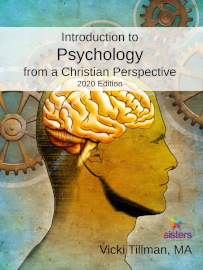Introduction to Psychology from a Christian Perspective is an introductory, one-semester course, appropriate for high schoolers. It is available only as a set of files in PDF format that includes the textbook Introduction to Psychology from a Christian Perspective, 2020 edition; Parent Info & Answer Key; lesson plans; and tests.
The course is presented in 16 chapters. It begins with biology, the first three chapters covering the physiology of the brain, senses and perception, and genetics. Chapter 4 reviews the science of learning under topics such as “Pavlov and the Conditioned Response,” “Skinner and His Rat Boxes,” “Principles of Learning,” and “The Biological Basis of Learning.”
Chapter 5: History of Psychology from Ancient to Pre-modern Times focuses primarily on disorders with snippets of how those exhibiting symptoms of mental illness were treated in the past—both negatively and positively.
The next chapter continues with more modern developments in psychology as we learn about the work of the Nancy School in France, Jean Charcot, Joseph Breuer, Sigmund Freud, Alfred Adler, Carl Jung, Victor Frankl, J.B. Watson, and B.F. Skinner.
The next two chapters explore communication, needs, and motivation. This is where we learn about topics such as body language, cultural differences in communication, Abraham Maslow’s hierarchy of needs, and his concept of self-actualization.
Chapter 9: Looking at Personality and Theory discusses Gordon Allport’s personality theory and the Myers-Briggs Type Indicator, is based on Carl Jung’s personality theory. It also mentions a few other personality tests that can be taken on your own, such as Dr. Gary Chapman’s Five Love Languages test. Enrichment suggestions for this chapter include links to online personality and typology tests.
The tenth chapter explores sleep and dreams while Chapter 11 is an extensive discussion of abnormal psychology. Chapter 12: Crisis Intervention recognizes the rise in mental health issues among teens, and it discusses self-care, seeking help when needed, and what to do if a friend is in crisis. Phone numbers are provided for emergency resources.
Chapter 13: Psychological Testing briefly addresses both academic and psychological assessments as it describes IQ tests, achievement tests, diagnostic tests, and career assessments. The next chapter on Christian counseling compares and contrasts biblical (exhortational) counseling with integrated Christian counseling without recommending or denigrating either.
Chapter 15: Understanding Research and Statistics teaches students to apply critical thinking to social media, advertising, and research. It adds an introduction to quantitative research with a brief discussion of topics such as internal and external validity. The final chapter, Careers in Psychology has very brief descriptions of 17 careers in psychology.
Students can work through this text independently, although a parent or teacher will need to plan for enrichment activities and evaluate written work. Some chapters would benefit from discussion, but it isn’t required.
The course is clearly written from a Christian perspective as you can see from this quote from Chapter 8: “The argument that Christians often have with Maslow is the emphasis on self. We are never taught to be self-centered. The idea of being self-consumed is abhorrent to Christians. Maslow is a humanistic psychologist, believing that man can be his own god.” (p. 66). Another instance in Chapter 12 suggests praying for a friend who is undergoing a mental health crisis.
At the same time, some Christians might take issue with the content in a few instances. For example, in the section on genetic counseling in the third chapter, it recognizes the typical lack of spiritual input from genetic counselors when faced with decisions about children in utero with serious, diagnosed problems. While it says that there might be better choices than abortion, it implies that in vitro fertilization might be a good option for those concerned about passing on serious genetic diseases. This fails to recognize the destruction of embryos which is typically part of the in vitro process—another form of abortion.
Options and Adaptations
The course can be easily adapted for average, college-prep, advanced, or honors-level students, and it can be expanded into a full-year course as well if students complete additional assignments. All of these options are explained in both the textbook and the Parent Info.
The textbook has only 120 pages, but the amount of work required for the course is flexible. Answering end-of-chapter questions, completing enrichment activities, reading books from the suggested list, and writing papers are all used to varying extents depending upon what type course you are designing.
Enrichment activities for some chapters recommend specific movies to watch. For instance, Chapter 6 suggests watching the movie, What About Bob?, then discussing how psychologists are portrayed. Examples of other enrichment activities are people watching and writing observations in a brief paper; “Choose a character and write a five-paragraph essay on how his/her needs motivated actions” (p. 68), and “Interview your pastor or a Christian counselor and write a one-page paper on his/her counseling style” (p. 104).
Examples of the recommended books for additional reading are Who Switched Off My Brain by Dr. Caroline Leaf, The Way They Learn by Cynthia Ulrich Tobias, and The Ten Unwritten Rules of Social Interaction by Temple Grandin, Ph.D. The books are not academic but are written for a general audience.
The optional enrichment activities and reading expand the course, but they also make it more interesting.
Online Course
Students can also enroll in the self-paced online course titled Introduction to Psychology from a Christian Perspective. They will need to purchase the text, then enroll in the course, since textbook purchasers receive a code for 25% off the cost of the course.
Summary
Introduction to Psychology from a Christian Perspective is one of the rare options for a high-school-level psychology course for Christians. The textbook is easy to use on its own, and the option of the online course will make that an even better choice for some students.









